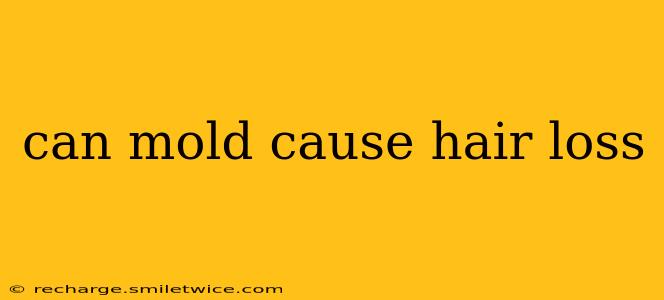Mold. The word itself conjures images of damp basements and musty smells. But beyond the unpleasant aesthetics, could this pervasive fungus actually be causing hair loss? The short answer is: potentially, yes. While not a direct cause in most cases, mold can indirectly contribute to hair loss through several mechanisms. Let's delve deeper into the complex relationship between mold exposure and hair thinning.
How Can Mold Exposure Lead to Hair Loss?
Mold doesn't directly attack hair follicles in the way some infections do. Instead, its impact on hair health is often indirect, stemming from allergic reactions, inflammatory responses, or the presence of mycotoxins.
1. Allergic Reactions and Inflammation:
Many individuals are allergic to mold spores. Prolonged exposure can trigger allergic reactions, manifesting as:
- Inflammation of the scalp: This can disrupt the hair growth cycle, potentially leading to hair thinning or shedding. The inflammation may present as redness, itching, and scaling.
- Systemic inflammation: Severe mold allergies can cause widespread inflammation throughout the body. This can stress the body, potentially impacting hair growth as nutrients are diverted to fight inflammation.
2. Mycotoxins and Their Impact:
Some molds produce mycotoxins – poisonous substances that can negatively impact health. Inhalation or ingestion of these mycotoxins can lead to various health problems, including:
- Hormonal imbalances: Mycotoxins can disrupt the endocrine system, affecting hormone production. Hormonal imbalances are a well-known contributor to several types of hair loss, such as telogen effluvium.
- Nutrient deficiencies: Mycotoxin exposure can impair the body's ability to absorb essential nutrients, including those crucial for healthy hair growth. This nutritional deficiency can weaken hair follicles, resulting in shedding.
3. Telogen Effluvium:
This type of hair loss is often triggered by significant stress on the body. Severe mold exposure and the resulting allergic reactions or mycotoxin effects can induce this stress response, pushing hair follicles into a resting phase and eventually leading to hair fall.
Can Mold in the Home Cause Hair Loss?
Living in a mold-infested environment significantly increases the risk of mold exposure and its potential consequences. If you suspect mold in your home, it's crucial to have it professionally assessed and remediated. Prolonged exposure can exacerbate existing health problems and increase susceptibility to hair loss.
What Other Factors Could Be Contributing to Hair Loss?
It's important to remember that hair loss can have numerous causes, and mold exposure is often just one piece of the puzzle. Other contributing factors include:
- Genetics: Androgenetic alopecia (male and female pattern baldness) is a common hereditary cause of hair loss.
- Nutritional deficiencies: Lack of essential vitamins and minerals, particularly iron, zinc, and biotin, can affect hair health.
- Medical conditions: Several medical conditions, like thyroid disorders, autoimmune diseases, and certain medications, can cause hair loss.
- Stress: High levels of stress can trigger telogen effluvium.
- Harsh hair treatments: Excessive heat styling, chemical treatments, and tight hairstyles can damage hair and lead to breakage.
When Should You See a Doctor?
If you're experiencing unexplained hair loss, it's crucial to seek medical attention. A doctor or dermatologist can properly diagnose the cause of your hair loss, rule out underlying medical conditions, and recommend appropriate treatment options. They can also assess whether mold exposure may be a contributing factor.
Conclusion:
While mold itself doesn't directly attack hair follicles, prolonged exposure can indirectly lead to hair loss through various mechanisms. Addressing mold issues in your home and consulting a healthcare professional to rule out other contributing factors is crucial in managing hair loss and overall health. Remember, early intervention is key when dealing with hair loss issues.
